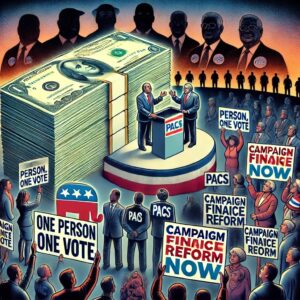Democracy is meant to be the voice of the people, where each vote has an equal say. However, the growing influence of money in politics is shifting the balance of power, making campaign finance a deeply contentious issue. As billions pour into political campaigns every election season, questions arise: Whose voices are really being heard, and what does this mean for the future of democracy? From the role of Political Action Committees (PACs) to the push for reform, understanding campaign finance is crucial to ensuring that democracy remains fair and representative.
Running a campaign is an expensive undertaking, from paying for television ads and digital outreach to organizing events and staffing a team. But over the years, the cost of winning an election has skyrocketed. In recent election cycles, the money spent on presidential, congressional, and state elections has reached record-breaking heights. This raises a key question: Is the growing cost of campaigns leading politicians to prioritize wealthy donors over ordinary voters?
Campaign funds often come from a mix of sources—small individual donations, large donations from wealthy individuals, and funds from PACs and Super PACs. For many politicians, donations from major contributors are essential to staying competitive, which can create a strong incentive to consider the interests of these donors when making policy decisions. Unfortunately, this dynamic can leave everyday voters feeling overlooked or even sidelined.
Political Action Committees (PACs) have been around since the 1940s, but they took on a new dimension with the rise of Super PACs following the Supreme Court’s 2010 Citizens United decision. While traditional PACs have limits on how much they can receive from donors and give to campaigns, Super PACs can raise unlimited funds and spend them independently to support or oppose candidates. This means that a single Super PAC with enough money can dominate the conversation around an election, spending millions to influence public opinion.
Though these groups cannot coordinate directly with candidates, their impact is undeniable. By pouring money into targeted advertising and social media campaigns, Super PACs can shape voters’ views on candidates and issues, sometimes without clear disclosure of who’s funding the messages. This lack of transparency can make it challenging for voters to understand whose interests are being promoted and why.
In response to the growing influence of money in politics, many advocates are calling for campaign finance reform. Proposals range from setting stricter limits on donations to increasing transparency requirements. Some argue for public financing of campaigns, which would reduce reliance on private donors altogether, allowing candidates to focus on issues rather than fundraising. However, reform efforts face significant challenges, particularly given the powerful interests that benefit from the current system.
One of the biggest hurdles to reform is the legal framework. Campaign contributions are often considered a form of free speech, making it difficult to limit them without facing constitutional challenges. Yet advocates argue that without reform, the very principle of “one person, one vote” is at risk, as big money continues to influence who gets elected and which policies get prioritized.
As campaign finance debates continue, voters are increasingly aware of the issue and are demanding change. Grassroots organizations, civic groups, and concerned citizens are raising awareness and pushing for reforms that would make politics more transparent and less reliant on big money. In some areas, cities and states are experimenting with new models, like publicly funded vouchers that let voters direct public funds to the candidates of their choice. These local experiments could provide valuable lessons on how to create a more balanced and representative system.
Ultimately, preserving the integrity of democracy requires finding ways to make sure that elected officials are accountable to all citizens, not just those with the deepest pockets. While the challenge is complex, every step toward a fairer campaign finance system is a step toward a healthier, more inclusive democracy.

